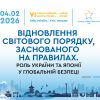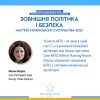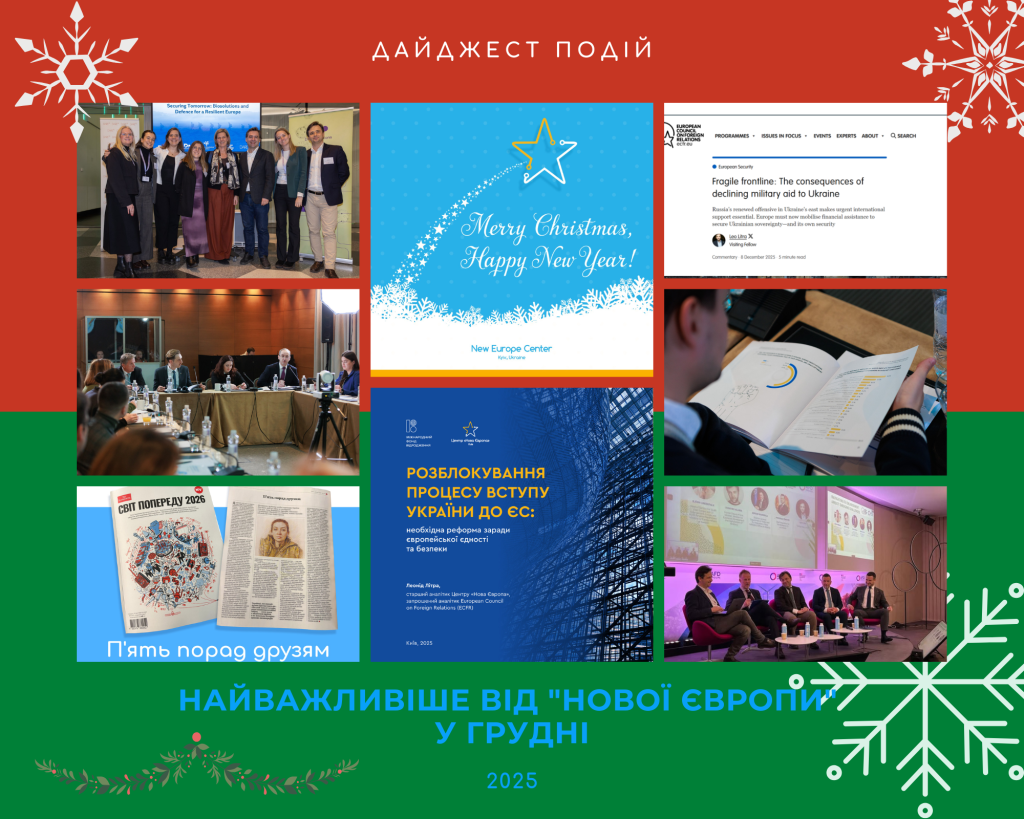European support for Ukraine was at a record high during the seven months of full-scale war with Russia. However, given the economic difficulties, particularly the rise in energy prices, European societies have heard calls to reduce support for Ukraine. There is a widespread misconception that the alleged support of Ukraine, and not Russia’s aggression, negatively affects the well-being of Europeans. At the same time, political, economic, and military aid remains vital for Ukraine, especially in the context of the counteroffensive of the Armed Forces of Ukraine in the war, Putin’s announcement of mobilization in Russia, and threats to the world with nuclear annihilation.
Therefore, within its traditional rubric “New Europe Wonders” the New Europe Center addressed leading European experts with the following question: “What more can be done to make sure European societies continue expressing support and solidarity with Ukraine despite economic hardships caused by Russia’s war against Ukraine?”
The survey was also published by TSN.
A few key tips that European opinion-leaders gave:
- the war should not disappear from the attention of the public, so Ukrainians should make efforts to ensure that the presence of Ukraine in the media remains high;
- politicians, experts and evacuated Ukrainians should make gestures of gratitude and send signals to foreigners that their help has an impact;
- EU citizens have to be explained Russia’s goals. In particular, the fact that the aggressor country is deliberately trying to put European societies and economies in front of threats, and Russia’s ambitions are not limited to Ukraine and are directed against the West. Thus, the economic difficulties are a consequence of Russia’s aggressive actions, and not the fact of the war itself.
Marcel Röthig, Resident Representative of the Friedrich Ebert Foundation in Ukraine
In an opinion poll conducted by the German “Forschungsgruppe Wahlen” in mid-August 2022, a clear majority of Germans were positive about military support for Ukraine: 36 percent wanted stronger support, 35 percent to continue the support as now and only 22 percent less support. When asked whether Germany should continue to support Ukraine despite high energy prices, 71 percent answered positively and only 20 percent negatively. The decisive factor here is approval, depending on the support of a political party: 75 percent of the supporters of the SPD (Chancellor Scholz’s party) and CDU (the leading opposition party), 70 percent of the liberal FDP and even 95 percent of the Greens voters want to support Ukraine even if economic hardships in Germany increase. Among voters of the far right and pro-Russian AfD only 18 percent are supportive to Ukraine. This shows that most voters from all democratic parties are in favor of supporting Ukraine even if this means rising costs in Germany. It is therefore important for Ukraine that the war does not disappear from the German public attention. The media presence must remain high. In addition, it is also important to send a signal to the people in Germany that their help is having an effect and is therefore important to be kept up. Gestures of gratitude, expressed both by Ukrainian politicians and by experts and Ukrainians in Germany, give the German people the feeling that their support is right and must therefore continue, even if the economic situation becomes difficult. The most important thing: positive wording! Explain what the military aid from Germany meant concretely, what was the effect of Germany’s cancellation of North Stream 2, what became possible due to German macro financial assistance and so on.
Roland Freudenstein, Vice President, GLOBSEC (Belgium)
First, we should acknowledge that most Russia appeasers are not on Putin’s payroll, but believe to act in the best interests of their countries. So this debate has to be about what is best for Europe, and not about who is or isn’t an agent of Putin.
Second, we should point out West European EU member states’ existential interest in a Ukrainian victory and a Russian defeat. The enormous cost of a triumphant Russia, with Ukraine totally destabilised, Putin’s rule cemented and further aggression predictable, must be drastically explained. Equally important, the benefit of a return to a stable, democratic and increasingly prosperous Ukraine must be emphasised. These long term calculations will help relativise the perceived cost of helping Ukraine in the eyes of Western citizens, with higher energy prices, more defence spending and reduced trade. Fear of ending up in a nuclear war with Russia should be realistically countered.
Third, we should constantly work on the unity of the West: Openly egoistic governments such as the Hungarian one should be ostracised, and hesitant ones like the German one need constant pushing by their neighbours and allies.
Who should do all that? Not just governments, but also political parties, think tanks and foundations, non-governmental organisations as well as prominent individuals: civil society at its best!
Jos Boonstra, Senior Researcher, Centre for European Security Studies (The Netherlands)
It will be challenging to keep the war in Ukraine on top of the agenda in the European Union (EU). Whereas support remains high, attention to the war is dwindling. Two mechanisms come to mind in keeping support to Ukraine at a high level.
Ukrainian refugees in the EU are an important asset in continued European support to Ukraine. Those who are still in the EU integrate quickly. In the workplace or community, they discuss the situation in Ukraine with their Polish, Dutch, and Spanish colleagues while their children do the same at school. Ukraine can also utilise refugees that returned by identifying ‘civilian ambassadors’. These former refugees can seek to stay in contact with the community of their host country and in that way keep Ukraine in focus in an informal way. Another, more direct, option would be a simple public campaign in winter with billboards stating texts like ‘Family X thanks family Y for their hospitality last year’, with a view to also remind people of the ongoing war.
Ukraine has been an active participant in the EU’s Eastern Partnership programme, including its civil society component. Now is the time to capitalise on this long-term investment of developing close ties between EU member state and Ukrainian civil society. What joined projects can be developed by NGO’s, human rights activists, think tanks, and universities that reach out to the broader population in the EU (instead of people in EaP countries)? Next to this, the close ties between civil societies from EU member states and Ukraine could be used to boost people-to-people exchanges through work visits, intern/fellowships, and cultural exchanges of Ukrainians to the EU and hopefully vice versa of West and Central European citizens to safe areas in Ukraine.
Dr. Rob de Wijk, Founder of HCSS and Professor of International Relations at Leiden University (The Netherlands).
A crucial challenge for Western societies is inflation caused by energy scarcity. EU sanctions and REPowerEU, aimed at creating geopolitical leverage vis a vis Russia by reducing Europe’s dependence on Russian energy, has backfired. Even if the energy supply will no longer be an issue in the coming winter, the damage done in terms of economic growth, inflation and popular trust in Governments cannot be repaired easily. This is reinforced by the fact that there are no examples of successful attempts to stop military adventurism by sanctions. In addition, due to decades of budget cuts the Europeans can do little militarily. Economic aid by the major European powers came to a standstill in august 2020. Support is mainly provided by the US, UK and Nordic countries.
Political and public solidarity with Ukraine remains strong but is of little value if not supported by meaningful military and economic aid. In practice, support will be generated when a war enters a new phase. If this is not the case, politicians should explain why this war is important to the West. The most powerful argument is that President Putin is pursuing a revisionist and revanchist foreign policy designed to upend the rules based order that enabled our security and prosperity after the World War II.
Dr. Liana Fix, Historian and Political Scientist (Germany)
Most importantly, Western politicians have to explain the geostrategic context of the economic and energy hardships. These are not just a side-effect of the war, but a deliberate Russian attempt at threatening European societies and economies. To uphold freedom and independence in European societies, this painful process of decoupling is therefore urgently needed. However, this alone will not be sufficient. It needs to be accompanied with large compensation measures for those part of the population that cannot afford the immense price hikes.
For the Ukrainian side, it is important to make clear that the economic hardships result from Russia’s aggressive actions, and not from the fact of the war itself – and therefore, an end to the war through an unjust ceasefire will not mean an end to the economic hardships. It is not in Ukraine’s, but in Russia’s hands. Furthermore, the Ukrainian leadership should continue to remind its European counterparts that Russia’s ambitions are not limited to Ukraine, but are directed against the West and European societies – and that Ukraine is the first line of defense. Especially once the threat perception decreases in European societies, there will be tendency to see the war as a regional, rather than a European war and Russia as a regional, instead of a European threat.
Dr. Florent Parmentier, Secrétaire général, CEVIPOF – Centre de recherches politiques de Sciences Po (France)
The support of the Ukrainian cause among public opinions has been exceptionally strong thorough European societies during the first six months of the war. Despite divisions about the most favorable outcome that can be expected from the conflict, European unity has been impressive on imposing sanctions against Russia.
As time goes by though, it is true resilience of every European society will be increasingly challenged – a process that can be summarized as ‘the battle between the TV and the fridge’ (heroic resistance vs. costs of sanctions). The Ukrainian political leadership has been able to secure support thanks to efficient PR communication and operations. While the campaign for sending weapons should continue, it is important that Ukraine defines its own realistic expectations vis-à-vis each country. Blaming Germany, Italy or other countries might prove counterproductive in the mid run; their history is different from Poland and the Baltic States. They have a different experience of Russia as a partner or as a threat. Also, defining a strategy for reconstruction or relying on local initiatives (e.g. twinning) may be much more appealing for many supporters. In this situation, indifference would be a danger for Ukraine.
Sylvie Kauffmann, columnist at Le Monde, fellow of the Robert Bosch Academy in Berlin
European leaders should keep hammering at home the message that Ukraine is fighting not only for its existence but also for our freedom and Europe’s security : “Freedom has a cost”.
The Ukrainian leadership has been very effective so far with its narrative. It should continue to spread it with more diversified speakers than President Zelensky : representatives of the civil society, MPs, anti-corruption activists, people who have taken part in the war on the frontline, doctors, legal experts working on war crimes. It is important to show that while fighting a war, Ukrainian citizens are also fighting to strengthen the rule of law and end corruption. This matters to the public opinion in the EU, as taxpayers’ money will be used to contribute to the reconstruction effort in Ukraine. It also matters to show the efforts being made in Ukraine to accelerate the country’s accession to the EU.
Ukrainian officials and NGOs should also work with trade union leaders in EU countries on the message for workers most affected by price hikes.
Dr. Ian Anthony, European Security Programme Director, SIPRI (Sweden)
In spite of fragmented information and deliberate misinformation campaigns, most people have no difficulty distinguishing “right” from “wrong” in the case of Ukraine. However, continuing to support Ukraine is also self-interest.
Two issues on people’s mind are the increasing cost of energy and the burden of defence spending when social needs are pressing.
Concessions to Russia might bring some short-term relief, but by confirming that energy is an effective tool Europe would become a perpetual hostage. Support to Ukraine pushes Europe past the point of no return to promote an energy transition that can addresses security as well as climate objectives.
Building the Ukrainian military into a modern and effective force is a step towards creating a European defence identity based on real capability rather than future promises. The United States is helping consolidate military cooperation among neighbours in Northern, Central and Southeast Europe, building partnerships and demonstrating to Washington that Europe is ready to share responsibility. A battle-hardened Ukraine can play an important role in this process.
A modern and well-resourced strategic communication strategy should be used to highlight to the public that continued support to Ukraine is in the self-interest of European citizens
Miriam Kosmehl, Senior Expert Eastern Europe and EU Neighbourhood , Programm Europas Zukunft, Bertelsmann Stiftung (Germany)
The decisions brought about by the Russian war of aggression deeply affect the social life and habits of Europeans and are out of all proportion to the suffering of Ukrainians at the same time. Since many are also unpopular, the broadest possible consensus among democrats, across national and party lines, is needed.
A “coalition of reason” drawn jointly from politics, academia, business, and civil society could have the robust legitimacy to be heard.
In view of the probable losses of prosperity befalling citizens, assessing all energy supply alternatives to Russian natural gas in an ideology-free manner is key, as is weighing and communicating economic and energy policy contributions in a comprehensible manner.
Most Europeans are prepared to go through a hard winter – if policymakers stand for competence and a sense of responsibility and cuts are socially balanced and credibly communicated as unavoidable. Then the situation would be comparable to a natural disaster, releasing forces of solidarity.
If the impression arises that, due to ideological pre-determinations or patronage politics, an avoidable energy shortage is created, which causes rising prices, insolvencies and drives people into poverty, then despair and consequent social unrest may be expected.
The broader and more united this “coalition of reason,” the greater the focus on pragmatism without ideology and the greater the chances for continuous solidarity with Ukraine. In terms of communication, not the amount is decisive, but that it is comprehensible, credible, and effective. Lately in the US state of California, a text message asked millions of residents to save energy. Citizens paid heed, and the warning proved critical in avoiding rolling blackouts during a heat wave that taxed the power grid.
Only a politically united Germany – one that stands together in times of severe crisis – in an economically strong Europe will be able to provide significant support to Ukraine.
Dr. Antonio Villafranca, Director of Studies, ISPI and Dr. Eleonora Tafuro, Research fellow at the Russia, Caucasus and Central Asia Centre, Italian Institute for International Political Studies (Italy)
European societies still largely support Ukraine. The sheltering of refugees is a clear-cut example – Italy hosts roughly 160,000 Ukrainian refugees, the second largest number in the EU. However, there are growing concerns about this support due to economic hardship. Rising energy prices and skyrocketing cost of living may take their toll on support by households and companies. Alleviating economic consequences for consumers would be the most effective way to ensure continued support for Ukraine. To this aim, EU governments should further step in to shield households and businesses from the surge in energy prices. But this is not an easy option for national governments as public budgets are under strain after the COVID-19 pandemic. To further alleviate the burden on citizens EU measures are therefore equally important: better coordination of energy policies, quick and deep evaluation of the feasibility of caps on energy prices, intraEU solidarity on the availability of gas and oil. At the same time, EU think tanks and media should keep the focus on Ukraine to make sure that citizens are constantly informed on the war and its dramatic impact on Ukrainians. In the medium-to-long run the EU should also speed up green transition to reduce its vulnerabilities and energy dependence (on Russia and other major energy exporters).
Emmanuel Dupuy, President, Institute European Perspective & Security (IPSE), France
After more than six months, the conflict in Ukraine has shown and confirmed a certain form of EU diplomatic and economic Unity, Solidarity and Subsidiarity, as well a collective security alliance within the 30 NATO member states, in regards to Russian aggression since the 24 of February 2020. Both were not expected in its durability.
But, as Autumn and “Rasputitsa” season is arriving, the resilience of the European Union population may be at stake, in regards to a certain «Ukraine fatigue» as well as a temporalization of the military front, at least in Donbass.
Taking the symbolic example of France, a recent poll confirmed that 74% of the French citizens consider that the 6 previous sanction packages have proven ineffective, as Gazprom has sold 85,1 billions of Euros to EU states and that Russia has gained 158 billions of Euros on oil and gas markets.
Thus, the political and electoral deteriorated climate in the upcoming months (Sweden, Italy, Bulgaria) should bring EU leadership (mostly Germany and France) to anticipate the “regime” crisis in the mentioned states by focusing on a more European strategic perspective, pooling and sharing the proposed ambition of the new EU “Strategic Compass” (March, 2022), rather than only depending on a “NATO Agenda 2030” polycentric approach, such as defined during the last Madrid Summit (28-29 of June 2022).
Concretely, the tools at disposal of the 27 member states (both CSDP and CFSP focus, such as PESCO, EPF, EDAP), moreover biding more strongly the 21 EU states inside NATO (today) and 23 EU member states, in regards to a NATO 32 states based organization (once Finland and Sweden have joined the North Atlantic Alliance) tends to confirm, that if USA and Great Britain are – and will continue to be – the strongest and more robust security providers of Ukraine, European Union and the 27 states composing it, should become the major actors and top sponsors of a more “global approach”, implying both a coordinated military solidarity with Kyiv and, moreover, a reconstruction – rebuilding of the State approach.
Anastasiya Shapochkina, President of geoeconomics think tank Eastern Circles (France)
Ukraine faces two key problems in France. The first is that Ukraine has never been on top of the French political agenda. It was Russia which occupied a space in the list of top ten most important countries, while Ukraine has been perceived as a periphery of Russia at best.
The second problem, a derivative of the first, is a low level of local expertise on Ukraine. In the French media, expert and political communities the discussion on Ukraine is driven by French and sometimes Russian experts and professionals of all trades, few of whom have ever been to Ukraine, while almost none understand Ukrainian language, history or internal politics.
One way to respond to these challenges is to increase human exchanges between Ukraine and France across the social sciences disciplines, including academic, artistic and political science fields. Leveraging the talent in the new refugee communities can also help this purpose. Another is to spread the word on Ukraine beyond Paris through the communication channels with the local elites throughout France, from National Assembly representatives to social and business clubs.
Dr. Kristi Raik, Director, Estonian Foreign Policy Institute (Estonia)
The bravery of Ukrainians is truly admired across Europe. Ukraine has been successful in shaping narratives about the war in European societies and can build on that success, as the political and socioeconomic context across the EU is becoming more challenging. It needs to be explained to people in the EU that their economic and energy problems simply cannot be solved by lifting sanctions or stopping support to Ukraine’s war efforts. Getting rid of energy dependence on Russia and helping Ukraine to push back Russia’s imperialist ambitions are essential for creating sustainable security in Europe. Supporting Ukraine is about defending ourselves. Ukraine is part of Europe. Of course, political leaders of EU member states have a crucial role to play in delivering this message to their populations, but communication by Ukrainians is also very important.
Ukraine and the EU should move ahead towards three major objectives: winning the war, reconstruction and EU accession of Ukraine. It is important that Ukraine signals strongly its determination to move ahead with all three issues hand-in-hand and seek synergies between the three processes. For example, anti-corruption measures and energy transition are both essential for each of the three goals: both are essential for security and resilience, key issues in the reconstruction process and important conditions for EU membership.
Dr Daniel Szeligowski, Head of Eastern Europe Programme and Senior Research Fellow on Ukraine at the Polish Institute of International Affairs (PISM) (Poland)
Everyone likes to be part of the success story, the Europeans included. Ukraine has, therefore, to make sure it is a success story as well. The recent Ukrainian counteroffensive in the East has been a case in point, clearly demonstrating to the world public opinion that a military investment in Ukraine brings tangible benefits and so the military assistance to the Ukrainian Armed Forces should be continued and even further increased. But Ukraine has to make sure it is a success story also in terms of state-building. This implies addressing the country’s well-known domestic political problems, which have often been too easily exploited in the international arena by the opponents of Ukraine’s support, who, by the way, do not necessarily take a pro-Russian stance in this way. Reaching out to the widest possible audience is of paramount importance and the presidential couple’s interview for VOGUE magazine was, in my opinion, a real hit, showing a very personal face of this war. Still, Ukraine will never be able to satisfy everyone and should refrain from such attempts.
This report was produced under the Ukrainian Think Tank Development Initiative (TTDI), which is implemented by the International Renaissance Foundation (IRF) in partnership with the Open Society Initiative for Europe (OSIFE). TTDI is funded by the Embassy of Sweden in Ukraine. The views and interpretations expressed in this report are the authors’ and do not necessarily reflect those of the Government of Sweden, IRF and OSIFE.








